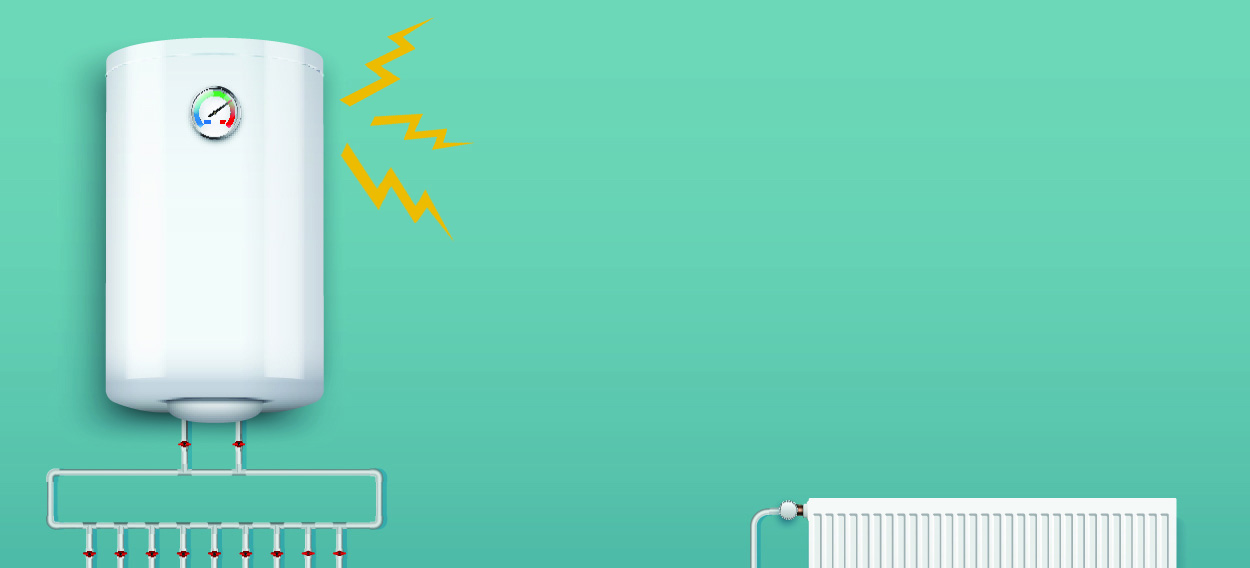Boiler Kettling – What’s That and How Can You Stop it?

Is your boiler making strange sounds – like whistling, popping, or rumbling? It could be experiencing boiler kettling, a common but often misunderstood issue in central heating systems.
This guide is here to help anyone who’s wondering “What is kettling in a boiler?” or asking “Is a kettling boiler dangerous?” Whether you’re a homeowner, a DIYer, or simply concerned about those unusual boiler noises, we’ll walk you through what boiler kettling noise actually means, what causes it, and, most importantly, how to stop it safely and effectively.
From limescale buildup and overheating to internal leaks, we’ll explore the most common reasons behind this issue and provide actionable advice to resolve it, or know when it’s time to call a Gas Safe registered engineer.
Table of Contents
What is a Kettling Boiler?
Never heard of boiler kettling before? Don’t worry – it’s more common than you’d think. The term refers to a specific boiler noise that sounds like a whistling, rumbling, or bubbling kettle. You might also hear popping or gurgling noises while the boiler is running. These sounds are caused when the water inside the system heats unevenly or boils, which it shouldn’t.
Normally, water in a boiler circulates smoothly and is heated to around 70°C. But if something slows the water flow, such as limescale buildup, sludge, or a faulty thermostat, it can cause the water to linger over the heat exchanger too long. When that happens, the water boils, creating steam and pressure, and that’s when you hear the unmistakable boiler kettling noise.
It’s worth noting that all boilers make some sound during normal operation, like the quiet hum of a pump or burner. But if you’re hearing a loud, irregular boiler whistling noise, that’s a sign something isn’t right.
Is a Kettling Boiler Dangerous?
You might be wondering – is a kettling boiler dangerous? The good news is that most modern boilers come equipped with built-in safety mechanisms that detect overheating or pressure issues. These systems will automatically shut the unit down before the situation becomes hazardous, even before the loud boiler kettling noise begins.
However, if you have an older boiler that’s making unusual sounds, such as whistling, popping, or rumbling – it’s a red flag. In rare cases, persistent boiler kettling can lead to increased internal pressure, which might cause pipes to burst, steam leaks, or even electrical risks if left unchecked.
While boiler kettling isn’t usually an immediate danger, it’s definitely not something to ignore. If your boiler is over 10 years old or the noise is getting worse, it’s wise to switch it off and contact a Gas Safe registered engineer for an inspection.
Why is Your Boiler Kettling?
Wondering why is my boiler whistling or making unsettling bubbling sounds? A kettling boiler is often the result of disrupted water flow inside the system, which causes the water to overheat and turn into steam. This is when you begin to hear the characteristic boiler kettling noise – whistling, popping, or rumbling, especially while your heating is running.
This doesn’t just make your appliance louder – it indicates that something inside the system isn’t functioning as it should. Whether it’s caused by mineral buildup, a malfunctioning thermostat, or a leak, ignoring the noise can shorten your boiler’s lifespan or lead to costly repairs. If you notice persistent issues, it may be time to book a professional boiler repair in London to avoid further damage.
Unchecked boiler whistling noise often signals the need for immediate servicing, especially if the sound has worsened over time.
We’ll now break down the most likely causes behind a kettling boiler and what you can do about them.
1. A leak in your boiler system
One of the most frequent causes of a kettling boiler is a leak somewhere in your central heating system. If you’re hearing a boiler whistling noise, this may be due to pressure fluctuations caused by escaping water, forcing your appliance to work harder and overheat.
Leaks can occur anywhere: inside the boiler itself, along the pipework, or near your radiators. Be sure to check the pipes under your boiler, around joints and valves, and behind radiators for any signs of dripping, damp patches, or corrosion.
Common causes of boiler leaks include:
- Poorly fitted or aging pipework
- Internal corrosion in older units
- Over-pressurised systems
- Failed seals or pressure relief valves
Even a small leak can disrupt the balance of your central heating system, trigger boiler kettling, and lead to costly breakdowns. If you spot moisture or your boiler pressure keeps dropping, call a Gas Safe registered engineer as soon as possible.
2. Your system is overheating
Another common reason for boiler kettling is overheating – when the water inside your unit gets hot enough to produce steam. This often results in a boiler kettling noise such as whistling, popping, or banging, as steam bubbles form and collapse inside the heat exchanger.
In most cases, boiler overheating is caused by a faulty thermostat that fails to regulate the temperature correctly. If the thermostat is misreading the actual water temperature, it may cause the boiler to keep heating well past safe levels. Blocked or restricted pipework can also reduce water flow, leading to heat buildup and eventual kettling.
Some older boilers are especially prone to this issue, and it can trigger system shutdowns or continuous cut-outs. If you’re wondering, “is a kettling boiler dangerous?” – the answer is yes, potentially. While modern boilers have safety features to shut down when overheating is detected, prolonged overheating can damage internal components and increase the risk of leaks or pressure issues.
If you’re confident, you can try adjusting or resetting the thermostat. But in most cases, it’s best to have a Gas Safe engineer inspect your system, especially if the boiler whistling continues or your unit keeps turning off unexpectedly.
3. Limescale and sludge build-up
Limescale in your boiler is one of the most frequent causes of boiler kettling, especially in hard water areas. Minerals like calcium and magnesium present in the water gradually settle inside your system, forming thick deposits in the boiler’s heat exchanger and nearby pipework. When this happens, the water can’t circulate properly – it slows down and overheats, causing boiler whistling noise or a bubbling, gurgling sound.
Alongside limescale, sludge in the heating system – a mixture of rust, magnetite, and debris can further restrict water flow, leading to cold spots on your radiators and inefficient heating. Sludge often accumulates in older systems or ones lacking proper chemical protection.
To prevent this, installing a magnetic filter and using scale inhibitors or central heating system cleaners can help maintain smooth operation. For severe cases, a chemical flush or power flush performed by a Gas Safe registered engineer may be needed to restore your system’s performance and stop the kettling noise.
If you live in a hard water area, consider investing in a water softener – it’s one of the most effective ways to prevent future boiler damage caused by limescale.
4. A faulty thermostat
If your boiler is older or hasn’t been serviced in a while, there’s a good chance the thermostat is malfunctioning. Over time, thermostats, especially in combi boilers or heat-only systems can degrade, causing inaccurate temperature readings and poor communication between components. This miscommunication may result in boiler overheating, which turns water into steam, producing a boiler whistling noise – one of the key signs of boiler kettling.
Sometimes, the issue stems from a faulty diverter valve or sensor, both of which may need replacement. If your boiler is over 10–15 years old and requires frequent attention, it might be more cost-effective to replace it with a new energy-saving boiler that meets ErP rating standards.
You should always contact a Gas Safe registered engineer to inspect the appliance. During a boiler repair service or annual boiler service, the technician can test the thermostat, adjust settings, and advise whether a full replacement is necessary. Routine checks not only prevent kettling boilers, but also ensure optimal heating performance and long-term safety.
5. Issues with your boiler pump
Your central heating pump plays a vital role in maintaining proper boiler circulation. Located near the boiler, this component is responsible for pushing hot water through your central heating system and back to the boiler. If the pump becomes faulty or worn out, it may struggle to circulate water quickly enough. As a result, hot water lingers in the heat exchanger, causing it to overheat and produce a boiler kettling noise, often described as whistling, gurgling, or banging.
A damaged or underperforming boiler pump can also lead to uneven heating, cold radiators, and higher energy bills. In some cases, airlocks or internal debris may be affecting the pump’s performance.
If you suspect a faulty boiler pump, it’s important to book a boiler repair visit with a Gas Safe engineer. They can check the pump’s speed settings, bleed air from the system, and determine if a replacement pump is required. Addressing pump issues early helps prevent further damage to your boiler and restores optimal flow through your heating system.
How to Stop Kettling in a Boiler
We can give you some pointers on how to fix a kettling boiler if you feel confident with your knowledge and experience. Please keep in mind that most of the following procedures are not for newbies, and if you’re uncertain of your skills, definitely hire a professional boiler engineer to fix your heating system safely. Also, repairs concerning the boiler itself, and not the external parts must be done only by Gas Safe plumbers.
Furthermore, if your boiler is new, working on the problem yourself as an unlicensed professional, you are most likely to void the warranty.
But here are several boiler kettling fixes you can check out:
Internal or external leak repair
If you suspect your boiler is leaking, whether from the unit itself or from the pipework, the best course of action is to call a Gas Safe registered engineer. Attempting to fix a boiler leak yourself with sealants, glue, or pipe wraps is not only ineffective but could make the problem worse, leading to pressure drops or even electrical hazards.
Leaks can often be the root cause of a kettling boiler, disrupting the pressure and water flow within your heating system. A professional can inspect the system thoroughly, identify the source of the leak (whether internal or external), and carry out a proper boiler leak repair by replacing damaged parts or sealing connections using the correct tools and materials.
Yes, boiler leak repair cost can vary depending on the extent of the damage, but cutting corners is never worth it. A quality repair ensures your boiler operates efficiently and safely, especially during colder months when heating demand is higher.
For peace of mind and long-term performance, trust the professionals to restore your heating system to its best.
Heat exchanger maintenance
A common cause of boiler kettling is a blocked or scaled-up heat exchanger. When minerals like calcium from hard water accumulate inside this vital component, they restrict water flow, causing the system to overheat and produce that familiar whistling or popping sound.
If you’re confident in your abilities and the build-up isn’t severe, you might be able to remove the heat exchanger, gently scrub it with a soft brush, and clear any visible debris. However, if the limescale build-up is extensive, the only safe and effective solution may be a heat exchanger replacement – a job best handled by a Gas Safe engineer.
To avoid future issues, schedule regular boiler maintenance, especially if you live in a hard water area. Installing a magnetic or limescale filter, using chemical inhibitors, or opting for an annual professional flush can greatly reduce sludge and mineral deposits. There are also simple things you can do to maintain the good condition of your boiler, such as bleeding your radiators, monitoring boiler pressure, and keeping the area around the appliance clean and well-ventilated.
Consistent maintenance is key when it comes to how to fix boiler kettling long-term. By keeping the heat exchanger clean and functioning optimally, you’ll extend your boiler’s lifespan and keep your heating system safe and efficient.
Replace your thermostat
A faulty thermostat is one of the leading causes of boiler kettling, especially when it causes your system to overheat. If your boiler is making a whistling noise, cutting out frequently, or heating inconsistently, the thermostat may be misreading the temperature, causing the water to boil and create that unsettling kettling sound.
If you suspect an issue but can’t pinpoint the exact fault, it’s best to call a Gas Safe registered engineer. They’ll test whether it’s simply a case of incorrect settings or a fully broken thermostat that needs replacing.
In older systems, thermostat failure is more common. And when paired with other inefficiencies, it may be more cost-effective to replace the boiler entirely with a new energy-efficient model. However, in many cases, a straightforward thermostat replacement is all it takes to restore normal function and silence that annoying boiler whistling noise.
Be sure to test your thermostat regularly and consider upgrading to a smart thermostat if your boiler is compatible – this helps maintain optimal temperatures and prevents boiler overheating in the future.
Perform a power flush
If your boiler is making a kettling noise due to limescale or sludge build-up, a central heating power flush service is often the best solution. This deep-cleaning method helps remove debris that blocks the flow of water, especially around the boiler heat exchanger, which is a common source of boiler kettling and gurgling sounds.
Wondering how to power flush a heating system? It’s not a DIY task. A Gas Safe registered engineer will use a high-powered external pump combined with chemical cleaning agents to flush the system thoroughly. This process clears magnetite sludge, rust particles, and mineral deposits, restoring normal flow and significantly reducing the risk of boiler overheating or noisy radiators.
A power flush not only fixes existing problems but also prevents future issues, especially if you live in a hard water area, where limescale in heating systems is more common. After flushing, engineers may recommend installing a magnetic filter to help capture future debris and maintain system performance.
Pro Tip: If your radiators have cold spots, your taps run slower, or your boiler makes popping or banging sounds, it might be time to book a power flush boiler service as part of your preventative maintenance routine.
Install a magnetic filter
Installing a boiler magnetic filter is one of the most effective long-term solutions for preventing boiler kettling. This compact device is attached to your central heating system and works by capturing magnetic debris (like rust and magnetite) as well as non-magnetic sludge particles circulating in the water.
Over time, sludge build-up inside your system can restrict water flow and lead to issues like boiler overheating, strange boiler noises, and reduced efficiency. A magnetic filter for boilers traps these particles before they reach sensitive components like the heat exchanger, reducing the risk of boiler kettling noise and prolonging the life of your boiler.
By installing a heating system filter, you help maintain clean water circulation, improve energy efficiency, and protect against expensive repairs. It’s especially beneficial after a power flush, as it keeps your now-clean system free from future contaminants.
Pairing a magnetic filter with an annual boiler service provides excellent all-around central heating protection and is highly recommended for households in hard water areas.
Get an electrolytic scale inhibitor
An electrolytic scale inhibitor is a smart, low-maintenance solution for preventing limescale buildup in your central heating system – one of the main causes of boiler kettling. These compact, maintenance-free devices alter the structure of the mineral particles (like calcium and magnesium) found in hard water, making it harder for them to stick to the internal surfaces of your boiler and pipework.
By reducing limescale formation, the inhibitor helps maintain efficient water flow, protects your heat exchanger, and minimises the risk of overheating and strange boiler noises. It’s an ideal option if you live in a hard water area, where boilers are more prone to issues like whistling or rumbling sounds.
Installing a scale inhibitor is a cost-effective way to extend the life of your boiler and reduce the need for power flushing or expensive descaling treatments. It’s one of the easiest ways to ensure smoother operation and ongoing boiler kettling prevention.
Combine a scale inhibitor with a magnetic filter and regular servicing for a full-spectrum boiler maintenance strategy.
Use an all liquid inhibitor
A central heating liquid inhibitor is a powerful chemical treatment designed to break down rust, sludge, and mineral deposits inside your heating system. It works by dispersing corrosive elements like magnetite, limescale, and other debris, helping maintain consistent water flow and reducing the chance of boiler kettling, whistling, or bubbling noises.
Using a boiler inhibitor regularly is one of the most effective ways to protect your system from internal corrosion, improve heat distribution, and extend the life of your heat exchanger and radiators. These products are often recommended by boiler manufacturers, and some warranties may even require that liquid inhibitors be added as part of your annual boiler maintenance.
Takeaways: Should You Be Worried About Boiler Kettling?
If your appliance is over 10 years old and showing signs of inefficiency, loud noises, or frequent faults, it might be time to consider a boiler replacement. Modern energy efficient boilers are not only quieter and more reliable, but also come with better heating controls, improved safety features, and higher ErP ratings, which can lower your energy bills long-term.
While a kettling boiler isn’t usually dangerous thanks to built-in safety shutoffs, it should never be ignored. The strange noises you’re hearing, whether whistling, bubbling, or popping – often point to underlying issues like limescale, sludge, or overheating.
We strongly advise against DIY fixes unless you are a qualified professional. Always contact skilled and trained boiler engineers who are Gas Safe registered to assess and carry out any boiler kettling fixes. Not only will this protect your heating system and home, but it also keeps your boiler warranty intact.
Boiler Kettling – What’s That and How Can You Stop it?
Need help? Hire the London Property Service experts today by giving us a call on 020 3078 5920.




